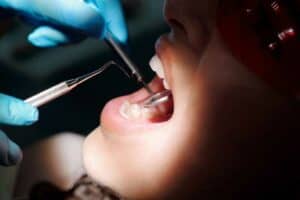
- Cavities
Let’s start with the most commonly treated dental condition – cavities. Cavities occur when teeth become weakened as a result of bacteria, or plaque. When there’s too much plaque on teeth, the bacteria naturally found in the mouth will feed on sugars from what we eat and drink and release an acidic byproduct. This acid will weaken tooth enamel, leaving the softer inner parts of the tooth vulnerable to acid attacks. The result is often a cavity, or essentially a hole in a tooth. Signs of cavities include:
- Tooth pain
- Bad breath
- Sensitivity to heat, cold, or sweets
- Brown or black spotting on teeth
- Unpleasant taste
We always recommend seeing your dentist in Livonia if you’re experiencing any of these symptoms.
- Bad Breath
Another incredibly common concern of dental patients is chronic bad breath. Not only can bad breath be embarrassing, but it may also indicate a bigger problem. Most cases of bad breath are a result of poor dental hygiene. This is one reason why your dentist will always recommend that you brush your teeth twice a day and floss daily. However, this isn’t the only thing that can cause bad breath. Some other considerations are:
- Dry mouth
- Certain Medications
- An Infection
- Acid reflux
- Cancer
Your dentist in Livonia will help assess what’s causing bad breath in the first place and recommend the best way to make it go away.
- Tooth Sensitivity
Tooth sensitivity is one of those things that may not cause problems all of the time, but when it does, the zings of sensitivity pain are certainly noticeable. This uncomfortable condition often results when the nerves inside teeth become exposed, allowing any irritant from hot soup to cold drinks to directly hit those nerves. Sensitive teeth are incredibly common and can be caused by:
- Cavities
- Gum Recession
- Enamel Erosion
- Chipped or broken tooth
- Older crowns or fillings
To help, your dentist may recommend a fluoride treatment or a specific type of toothpaste designed to help sensitive teeth. Other solutions may include a new dental crown or a root canal, depending on your individual needs.
- Gum Disease
Gum disease is also incredibly common with nearly 50% of Americans over the age of 30 having some form of it, according to the CDC. But this isn’t just an oral health problem. In fact, numerous studies have linked gum disease to things such as respiratory disease, rheumatoid arthritis, coronary artery disease, and problems controlling blood sugar in diabetes. The earliest stage of gum disease, called gingivitis, can be treated and reversed. However, if it progresses into periodontitis, it can’t be cured and could lead to tooth loss. If you notice any of these symptoms of gum disease, see your dentist as soon as possible.
- Bleeding gums
- Red, swollen gums
- Bad breath
- Pain when you chew
Maintaining regular checkups with your dentist is key to preventing oral health problems. But don’t forget that it’s also important to take great care of your teeth at home. This means properly brushing and flossing daily, avoiding tobacco products, and eating plenty of tooth-friendly foods such as fresh vegetables.
We’re always welcoming new patients at our dental offices in Ann Arbor, Canton, Farmington Hills, and Livonia.




